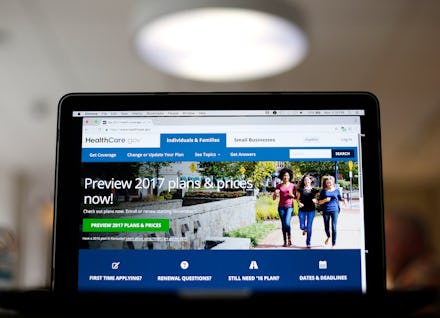The number of people without insurance could double if Congress repeals parts of Obamacare

If Congress were to institute a partial repeal of the Affordable Care Act, aka Obamacare, it could increase the number of uninsured people from 28.9 million to 58.7 million in 2019, according to a new report by the Urban Institute published Wednesday.
"This scenario does not just move the country back to the situation before the ACA," the report warns. "It moves the country to a situation with higher uninsurance rates than was the case before the ACA's reforms."
Partially repealing the law without first locking in a viable replacement — a possibility, given the lack of consensus on health care in Congress — could strip insurance from many of the same Americans who voted for "repeal and replace"-proponent President-elect Donald Trump.
Of the newly uninsured, 82% would be in working families, 56% would be non-Hispanic white Americans and 80% would lack college degrees, according to the report.
Young people in the United States would also feel the pain, with 18- to 34-year-olds comprising 38% of those losing insurance.
"You know, the report really is consistent with what we've been saying here in the administration, that there really is no such thing as 'repeal and delay,'" Health and Human Services press secretary Marjorie Connolly said. "It would unfortunately be repeal and collapse if there is not a replacement plan stapled to the bill, because of the uncertainty it would cause in the market."
Indeed, as soon as the ACA is repealed, "insurance companies could bail on Obamacare immediately, even if there is a three-year grace period, leaving people with no health plans," as Politico pointed out.
Connolly explained why that is: "What a lot of people don't know is that health insurance companies start making decisions about whether they'll be in the market in 2018 in just a few months, so if they don't know what the plan is going forward, they will likely either drop out or raise prices."
Even if individual marketplace plans remain accessible, repeal could hike out-of-pocket costs by as much as $1,500 per year by 2018, according to a study from the RAND Organization and the Commonwealth Fund.
"Health insurance markets are a fragile thing and you can't expect to just wave a big stick around and not do a lot of damage," Tim Jost, an emeritus professor in health law at the Washington and Lee University School of Law, said. "Congress and the president[-elect] need to proceed very, very carefully and until they have a clear path forward proposed, they should not significantly disrupt the ACA ... 'Repeal now, replace later' is not a viable plan."
Hospital groups are already warning that an ACA repeal could be financially devastating and trigger a public health crisis.
Indeed, a big jump in the rate of the uninsured could have serious human consequences: A Harvard University study from 2009 found that uninsured working-age people have a 40% higher mortality risk than those with insurance.